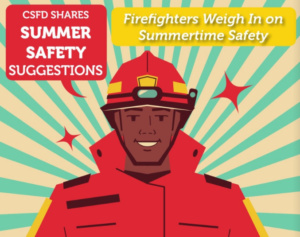CSFD Shares Summer Safety Suggestions
Firefighters Weight In on Summertime Safety
Article Courtesy of Stuart Marrs, CSFD Captain
The Spring of 2020 was defined by a viral pandemic, grocery store panic, and homeschool pandemonium. Our community quickly adapted to social distancing, mask-wearing, and drive-by birthday parties. Now summer is approaching, and CSFD has a few extra suggestions to keep in mind for a safe summer.
Even if your summer plans are a jumble of cancellations and uncertainty, here are three things you can count on – the Texas sun will be hot, the grill will be fired up, and the fireworks will burn bright.
BEAT THE TEXAS HEAT
Central Texas summers are hot, and firefighters know how to deal with the heat. Part of responding to an emergency scene is having a plan to keep our firefighters from overheating. This is especially important during the summer months when overexertion can lead to heat exhaustion or heat stroke. Firefighters carry coolers of ice water, electrolyte drinks, and wet towels to cool and replenish their bodies after strenuous work.
Each summer CSFD responds to 9-1-1 calls for heat exposure. These calls typically come in during the afternoon after people have been exposed for several hours.
“If you plan to work or play outside during the summer months, drink water before, during, and after your activity,” suggests Captain Josh Varner. “Avoid alcohol and understand how your medications impact your ability to work in the heat and sunlight. Work during the cool of the morning. Pay attention to your bladder and pay attention to your sweat. If you haven’t needed a bathroom break in a few hours or have dark urine, you’re dehydrated. If you stop sweating, you’re in serious trouble.”
These signs and symptoms of heat exhaustion should prompt you to stop working, move to the shade or into an air-conditioned space, drink water and a sports drink, and drape a wet towel or bandana over your head or neck:
- Excessive sweating
- Dizziness or faintness when standing
- Rapid, weak pulse
- Muscle cramps
“Drink water until you pee, and then drink some more,” Varner adds, “You should be done working for the day and focus on recovering.”
Heatstroke is a much more serious condition. Noticing the following signs in yourself or others should prompt you to call 9-1-1:
- Rapid, strong pulse
- Pounding headache
- Dry, hot, red skin
- Loss of consciousness
“Heatstroke means your body temperature is over 104 degrees which will damage your heart, brain, kidneys, and muscles,” Varner explains. “So paramedics will use any means necessary to cool you down. This includes removing clothing, putting icepacks in your armpits, and administering IV fluids.”
FIRE UP THE GRILL
Summer is primetime for throwing some USDA Prime on the grill. Whether you’re a charcoal king or prefer to cook Hank Hill-style (propane burns clean, Bobby), you’ll need to follow some simple rules.
“Practice ‘social distancing’ from the heat,” says Firefighter Jacob Aeschliman. “Keep kids and pets a safe distance from the grill so they don’t get burned or knock it over.”
Place your grill at least ten feet from combustible materials and never leave it unattended.
“Don’t forget to look up,” Aeschliman says. “The ten-foot rule includes tree branches and the eaves of your house. Fighting attic fires in summer is wicked hot, and that’s what happens when you light the grill next to your house and don’t keep an eye on it.”
For more information about these safety tips and other community risk reduction efforts, contact the College Station Fire Department at 979.764.3712 or contact the author at smarrs@cstx.gov
